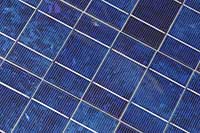Jan 14 2008
A 30 kw solar photovoltaic (PV) system was switched on at Delta Products’ office in Research Triangle Park (RTP) on January 7, 2008. Comprised of 160 solar panels, the array is the largest corporate-owned, roof-mounted solar PV system in the state. On average, it will produce about 36,000 kilowatt-hours (kwh) of electricity each year — enough to power 3 to 4 typical NC homes and offset approximately 37 tons of carbon dioxide annually.
 Solar photovoltaic panel detail
Solar photovoltaic panel detail
“This solar power system in RTP, NC is the largest one Delta has installed in the U.S. Delta’s mission is "To provide innovative energy-saving products for a better quality of life" which expresses our commitment to environmental protection. Being the world leader in supplying high efficiency power supplies, Delta continues to dedicate resources to raising the efficiency of power supplies to reduce the energy consumption of computers, data centers, communications, and consumer products. Delta’s leading technology in clean energy includes solar panels and solar inverters for solar power generation. The system in RTP, NC is one of ways Delta can help to slow global warming.”said M.S. Huang, VP and GM Delta Products Corporation.
Delta partnered with Triangle-based sustainable energy company Southern Energy Management to engineer, design and install the solar system. “We are thrilled we had the chance to work with Delta on this project, which we believe is just the first of many milestones to come for North Carolina’s burgeoning solar industry,” said Bob Kingery, co-owner of Southern Energy Management. “This project demonstrates that large-scale solar systems are feasible, and that solar power is a smart financial investment for companies.”
Delta has focused on environmental issues for the past several years. The company is actively pursuing research in clean, renewable energy technologies, and studying how to effectively use resources. While economic incentives make solar more attractive as a corporate investment, Delta has additional reasons to invest in solar power. Renewable power supplies, including solar inverters and solar cells, are a core part of Delta’s global product line, and switching power components are a primary focus of the company’s engineering R&D lab in RTP.
The electricity generated by Delta’s solar system flows directly into nearby utility power lines, adding to the supply of locally produced clean energy and earning Delta approximately 18 cents per kWh — about 4 cents per kWh from the utility, and an additional 14 cents per kWh from the NC Green Power program.
In addition to NC GreenPower and utility payments, Delta received generous tax incentives for its solar system, including state and federal tax credits, and accelerated depreciation. Altogether, these incentives cover more than 70% of the cost of the system, which will pay for itself in less than 12 years.
“One unique opportunity we had with this project was engineering the system around Delta’s own solar power inverters,“ said Shawn Fitzpatrick, P.E., lead solar engineer at Southern Energy Management. “We also ballast-mounted the solar panels, which means there are no penetrations made to the roof, so the system offers lower liability and requires less maintenance over time.”
Until now, the largest corporate solar PV systems in the state have been around 10 kW, about one-third the size of Delta’s new array. But larger corporate solar systems are already on the horizon.
“For the time being, Delta’s PV system has set a new standard in the trend toward large commercial solar systems in our state,” said Kingery. “In our minds, they definitely deserve some recognition for stepping up as leaders and helping pave the way for other business leaders to incorporate solar power into their sustainability programs.”